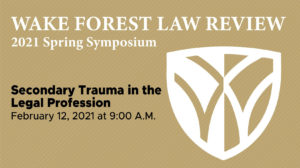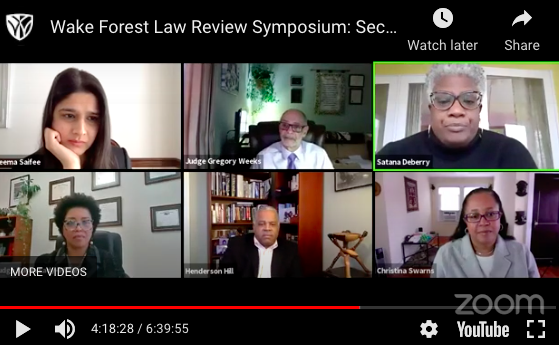
Please click here to read our panelists’ bios. (Opens PDF in new tab)
The Wake Forest Law Review hosted its 2021 Spring Symposium virtually on February 12, 2021 starting at 9:00 A.M. Our Symposium addressed Secondary Trauma in the Legal Profession. This event was free and open to the public.
In the legal profession, we represent people who have been traumatized by crime, abuse, environment, or even the legal system itself. Lawyers, judges, and participants are at risk of suffering from “secondary trauma” as a result of the work. The effects can include burnout, fatigue, depression, family life disruptions, and substance abuse, among other things. The traumatic effects have almost certainly been exacerbated by the pandemic and the social and political unrest of the last year. There are ways out, ways to be resilient. Awareness of the risk of secondary trauma is the first step.
The Wake Forest Law Review 2021 Spring Symposium addressed the traumas that lawyers as well as non-lawyers face as a direct result of the legal system, the enhanced impact of secondary trauma with regard to race, and how lawyers can take leadership to address the issues associated with secondary trauma in legal professions.
The NC State Bar has approved the Symposium for 5.00 hours of CLE credit, of which 3.00 hours will be available to satisfy the Substance Abuse/Mental Health Awareness requirement, and 2.00 hours will be available to satisfy the Professional Responsibility/Ethics requirement.
Please click here to read our panelists’ bios. (Opens PDF in new tab)
Panel 1: The Risk of Secondary Trauma in the Legal Profession and Increasing Awareness (9:00 A.M.–10:00 A.M.)
This panel began with an introduction to the program and will feature a description of secondary trauma and its significance as well as testimonials from individuals who have directly experienced the effects of secondary trauma, including lawyers and those on the periphery of the legal profession. Testimonials were given by Eilene Zimmerman, author of Smacked: A Story of White Collar Ambition, Addiction, and Tragedy; Robbie Grier, the jury foreman from a Charlotte death penalty case; and Lt. Col. Andrea Hall, a U.S. Air Force JAG who defended sex abuse cases. This panel was moderated by Professor Mark Rabil from the Wake Forest University School of Law.
Panel 2: Secondary Trauma Studies of Lawyers & Judges (10:05 A.M.–11:05 A.M.)
This panel took an academic look at secondary trauma and introduce research studies demonstrating the impact of secondary trauma across different legal fields. Associate Professor Lindsay M. Harris from the University of the District of Columbia, David A. Clarke School of Law discussed a study of secondary trauma focused on immigration attorneys. Professor Mark Rabil from the Wake Forest University School of Law, Dr. Stephannie Walker Seaton, from the Wake Forest School of Medicine, and Kimberly Wiseman, M.S. from the Wake Forest School of Medicine, discussed another study of secondary trauma focused on capital defense attorneys. Finally, Dr. Dawn McQuiston from Wofford College discussed a study in which students are interviewing judges in North and South Carolina about their experiences in the courtroom with different types of cases, sources of judicial stress, and stress management. Dr. McQuiston also served as the moderator of this discussion.
Slides from Prof. Lindsay M. Harris (Opens PDF in new tab)
Slides from Dr. Dawn McQuiston (Opens PDF in new tab)
Slides from Dr. Stephannie Walker Seaton and Kimberly Wiseman (Opens PDF in new tab)
Panel 3: Practices to Reduce the Risk of Secondary Trauma (11:10 A.M.–12:10 P.M.)
This panel discussed practices that the legal profession can employ to reduce the risks of secondary trauma such as creating spaces for quiet time for meditation or contemplation, critical debriefing, physical activity, mindfulness practice, retreats, and structural reforms that foster self-care. This panel also discussed the importance of beginning to increase awareness and teach practices to reduce risk during legal education. The speakers featured on this panel included Katherine Porterfield, Ph.D., a clinical psychologist at the Bellevue/NYU Program for Survivors of Torture; Mark Godsey, a former prosecutor who is now the director of the Ohio Innocence Project and a professor at the University of Cincinnati College of Law; Donna Mayerson, Ph.D., who has worked alongside Professor Godsey, and Cheryl Niccum, a social worker who works with US Attorneys to prosecute sex abuse, pornography, and human trafficking cases. Professor Mark Rabil served as the moderator of this discussion.
Slides from Katherine Porterfield, Ph.D. (Opens PDF in new tab)
Panel 4: The Intersection Between Secondary Traumatic Effects and Race (1:00 PM–2:30 P.M.)
Secondary trauma has an enhanced impact when race and the law intersect. The history of racial injustice in America has been highlighted by recent events, and it is important now more than ever to understand and appreciate the impact the legal system has on people of color. This panel featured Christina Swarns, the Executive Director of the Innocence Project; Henderson Hill, a senior attorney on the ACLU Capital Punishment Project; the Honorable Judge Gregory Weeks, a retired Superior Court Judge in North Carolina who has served as chair of the North Carolina Commission on Racial and Ethnic Disparities in the Criminal Justice System; Satana Deberry, Durham’s District Attorney; and the Honorable Judge Karen Eady-Williams, a Charlotte Superior Court Judge. Seema Saifee, a former Innocence Project Attorney and now a Quattrone Fellow at the University of Pennsylvania School of Law, moderated this discussion.
Panel 5: Lawyers Taking Leadership (2:35 P.M.–3:35 P.M.)
The final panel of the Symposium focused on the path forward toward addressing secondary trauma. The panel focused on how the legal profession as a whole as well as individual lawyers can take steps to address these occupational hazards. This panel featured the Honorable Carlton Reeves, a Federal Judge in the Southern District of Mississippi; the Honorable Cheri Beasley, former Chief Justice of the NC Supreme Court; and Derrick Johnson, President and CEO of the NAACP. Professor Kenneth Townsend from the Wake Forest University School of Law moderated this discussion.
Please follow our registration link for more information and to register for this event: https://wakeforest-university.zoom.us/webinar/register/WN_9GCjKamhT-K6QW_6W7nb_w

